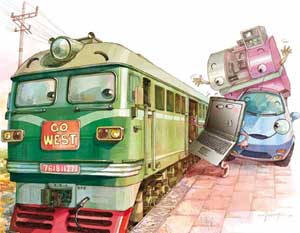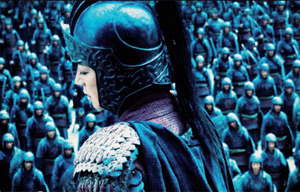Economic powerhouse's resilience
Updated: 2011-10-26 14:19
(Xinhua)
|
|||||||||
HANGZHOU -- Senior provincial officials and business leaders have allayed public worries about the health of East China's economic powerhouse after a number of private enterprises were pushed to the verge of bankruptcy when bosses were unable to repay informal high-interest loans.
Zhao Hongzhu, chief of the Zhejiang provincial committee of the Communist Party of China, told Xinhua ahead of a business forum on Tuesday in the provincial capital Hangzhou that the debt crisis seemed unlikely to affect the province's business environment or its overall economic growth.
"Overall, small- and medium-sized enterprises (SMEs) in the province remain healthy. There was no sharp increase in business closures," Zhao said, adding that 91,601 new businesses were registered in Zhejiang from January to September this year, up 12.3 percent from the same period last year.
Zheng Yumin, head of the provincial industry and commerce bureau, said only about 244 enterprises declared bankruptcy this year.
"An enterprise also has a natural cycle of birth-to-death. There is nothing to worry about," the official told thousands of Zhejiang businesspeople gathered from home and abroad for the first World Zhejiang Entrepreneur Convention.
The provincial party chief said, in general, the output of the province's manufacturing sector grew 21.9 percent in the first nine months, with profit growth rising 33.5 percent from a year earlier.
Coastal Zhejiang has been known for its shrewd businesspeople throughout the ages. Private enterprises took off in the 1980s when China started market economic reforms. The region has become prosperous and, today, the private economy has become a pillar of the local economy, accounting for about 70 percent of the gross domestic product and sustaining 90 percent of jobs.
But Wenzhou, which particularly boasts the success of entrepreneurship, has been affected by a severe debt crisis since April.
More than 90 bosses of private companies in the city were reported to have disappeared, committed suicide or declared bankruptcy -- invalidating debts of about 10 billion yuan ($1.57 billion) owed to banks and individual creditors pooled from the informal lending market. The most recent runaway boss case occurred on Oct 18.
Businesspeople said they rapidly expanded their businesses during the credit binge created to stimulate the economy during the 2008-2009 global financial crisis, but found themselves unable to repay bank loans and subsequently informal high-interest loans this year when banks were ordered to tighten lending to curb inflation.
Observers have worried that the debt crisis could escalate as informal loans are popular among SMEs across Zhejiang and in neighboring provinces despite annual interest rates usually set at 25 percent or more, compared to the 6.5-percent bank lending rate.
Zhao said the debt crisis has complicated causes but is primarily a result of poor management, excessive business expansion, misjudged investment, and a habitual over-reliance on informal lending.
"But it is not just Wenzhou. The credit crunch is being felt by most SMEs across the region and this only underlines the huge difficulties for small firms to get loans from banks," said Wang Licheng, chairman of the board of Hangzhou-based Holley Group.
Reports say a similar debt crisis is unfolding in the desert boomtown of Ordos in Inner Mongolia autonomous region.
The credit crunch has reminded some Wenzhou residents of an even greater debt crisis that occurred nearly 30 years ago. In 1986, hundreds of businesspeople fled, several committed suicide and others were illegally "detained" by desperate creditors, leaving thousands of households bankrupt.
Some compared the debt crisis to the sub-prime crisis in the United States that heralded the 2008-2009 global financial crisis.
But Jane Jin, chief representative of the Shanghai Office of Credit Suisse (Hong Kong) Limited, said she does not think it will seriously affect the Chinese economy.
"Because in most cases the non-performing loans are from the informal private lending. There are reports of bank loans involved, but as long as the percentage remains low, it won't be a big problem," she said.
Wang, one of Zhejiang's most successful businesspeople, said entrepreneurs have regained some confidence as the government stepped in to intervene.
Party chief Zhao said he had ordered province-wide salvage efforts and strengthened monitoring of debt situations.
Zhao said the effects of these policies are beginning to show with some "runaway bosses" returning.
One prominent returned boss is Hu Fulin, president of the Xintai Group, China's largest eyeglasses manufacturer. He fled to the United States to escape a 1.5-billion-yuan debt in September, but returned after banks agreed to relax repayment terms.
In a video clip sent to Tuesday's convention, Hu said he fled under tremendous pressure as bank loans could not be issued in time to repay his debt to high-interest private lenders.
"I felt like I was riding on a tiger all the time. Every night I had nightmares," Hu said. "But now, as the bank allows me to borrow and the government lends a helping hand, I have found the confidence to stand on my feet again."
Wang, the businessman, urged the government to further intervene by setting up a policy bank -- SME Development Bank, for example -- to provide favorable loans to help China's private SMEs grow into competitive firms.
Meanwhile, police have begun arresting runaway bosses caught in the credit crunch in an effort to protect the interests of creditors and employees who cannot get their wages.
Most of Wenzhou's 9 million residents have some amount of money invested in the informal lending market, with a recent poll conducted by the People's Bank of China's Wenzhou branch showing that 89 percent of the 300 respondents said they had invested in the informal lending market.
Officials said the next step for provincial authorities is to focus on regulating the informal lending market to prevent such a debt crisis from happening again.
"The core issue waiting to be addressed is the informal lending. We need to provide a platform and issue rules to regulate the market," said Zheng, the provincial industry and commerce bureau chief.
For the short term, Party chief Zhao said authorities will strengthen supervision over informal loans to ensure they mostly go to small companies and individuals who need short-term funds in the initial business phase.
He also said authorities would crack down on illegal fund raising and financing that threatens financial stability.











